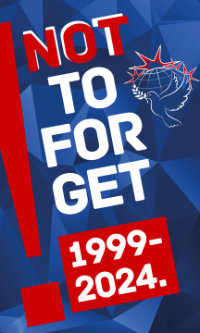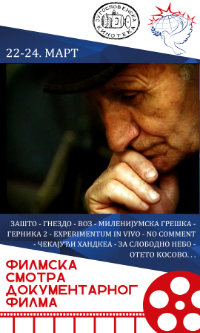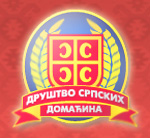Europe in the New Cold War
| Activities - Comments |
International Manifesto Group,
Monitoba, Canada

Statement of Mr. Rade Drobac in Zoom Conference Europe in the New Cold War,
14th March 2021.
Ladies and Gentleman,
Dear colleagues,
I would like to thank the organizers for giving me the possibility to speak today here and praise them for choosing such an interesting subject.
In the same time, on behalf Belgrade Forum for the World of Equals that I am representing as a Deputy President, I am taking this opportunity to transmit to all the participant best wishes for the success of this discussion panel.
Dear colleagues,
I think that today we can’t speak about “new cold war” because the actual situation in the world and the repartition of forces on the international level, even in Europe itself, is totally different than it was during the period of cold war. Then we had just two super powers confronted ideologically and strategically. Today we are living in the post American world, in emerging multilateral reality, characterized by the appearance of a new powers and a number of states that are rapidly strengthening themselves to the point to become a challenge to every super power. Also, today, there is no more ideological conflict between the opponent forces, just strategic, political and economic differences.
Let me remind you that in the time of cold war Europe was divided between Western, capitalist countries, and Eastern, socialist countries, aligned in NATO and Warsaw pact, with some neutral countries, such as Yugoslavia. The blocs were confronted in many questions, in first place about the vision of the world, ideologically. What was incontestable at that time was the leadership of USA over the Western and SU over the Eastern bloc. Their rivalry resulted in regional crises, race in arms production, local wars and instabilities, verbal confrontation but the global war didn’t happen because of the balance of power and fear between them.
Such a situation facilitated the appearance of the third bloc, Movement of Non-aligned countries, which occupied the space between them and became important factor in the international theatre, balancing between them and defending the interests of small countries and the improvement of the international low and cooperation. One of the leading countries of that movement was Yugoslavia, that helped many small countries to get independence and liberate themselves from colonial powers, to grow economically, to get strength politically and to unite in that international movement in their own interest and in the interest of all small countries. But, despite its importance and big number of members, the movement never had enough capacities to become a third super power. It was just a big international voting machine without real power-military and economically.
When we speak about today’s Europe, we have to have in mind that actually the big majority of European countries are members of the European Union (EU), or are in some relation with it. That’s mean that almost whole today’s Europe is oriented toward “Western values”, what ever that means, from EU member countries, candidates for membership countries, even “neutral” ones, such Sweden or Switzerland, or Norway, for example, not member of EU, but member of NATO. This is the consequence of the period of USA domination over the world as a unique super power, after the break out of SU in a number of new independent states, used by USA to take them under its influence. The result id that today almost whole Europe is a zone of influence of USA.
But, if almost whole Europe is today politically oriented to the West, that doesn’t mean that EU and other countries in Europe close to it are unified and without problems. EU had passed years of grow and strength, political influence and financial power, from small group of countries to a potent internationally important organization, from 6 to 28 member countries, from union of countries gathered for one purpose to almost super state. During a long period from 1952 when EU was born, until today, changing its structure, unifying every time more, from Rome agreement in 1958, unification of the executive powers in 1967, Maastricht agreement in 1993, Amsterdam agreement in 1999, adoption of Euro in 2002, Nice agreement in 2003, to Lisbon Treaty in 2009, that international organization, with ambition to became global power and global multiethnic and multi confessional super state, took many faces and practices, attracted many European countries to be part of it, in the attempt to became a super power. From 1952, it enlarged six times, from 1973, 1981, 1987, 1995, 2004, 2007, until 2013 when Croatia became its 28-th member. But it seems that last ten years EU is facing serious problems and the erosion of its unity and power. It started to loose discipline of the member countries, unity over the same goals, strength, vision, support of the member states, facing differences of the member states about internal and international policies, the policy of enlargement and, it seems, began to understand, if true, that Brussels overestimated its power to manage so many different countries and oblige them, despite their particular interests, to unify over same goals. Nowadays we are witnessing that United Kingdom (UK) has left EU, searching its freedom, suzerainty and independence, not without problems and consequences on both sides. The exit of UK left EU much weaker than it was, especially damaged its image of prosperity, wellness and progress and worse, left it without vision how to overpass the situation when one of its most prestigious members has left the organization. Moreover, it is more that clear that between EU members there is different views about the structure of the organization and its future transformation. There is the group of the countries that advocate stronger unification of the executive power in the attempt to become global multinational super state with the main power in Brussels, with supremacy over the nation states and its executive power. But also, there is a number of countries that oppose to that, especially and openly countries members of the Visegrad group - Hungary, Poland, Slovakia and Czech Republic, that don’t want to leave their national executive power to Brussels.. This problem is becoming every day more evident and important blocking the efficiency of the organization in many fields, including finances, budget, internal and foreign policies.
Speaking about the problems of EU, one of the most urgent to resolve is also the relation between USA and EU. During the mandate of the former American president D. Trump, the differences between USA and EU become very serious, from political priorities, economic cooperation with RF and China, defense policies and about energy supplies. EU is now in the situation to decide if it would continue to be, as it was until D. Trump come to power, strongly linked to USA, or to search its own road. In both cases it has to resolve the relations between its two strongest member states, Germany and France, differences between nationalist countries, such as Visegrad group, and globally oriented ones, and to settle its relation with USA and UK.
So, it is evident that today’s world differ very much from the one during cold war and already elaborated arguments give reason why today we can’t speak about cold war but what we can is to speak about hope that the new balances of power in the world could be the opportunity to start again to respect international law, not only interests of the most mighty countries.
Belgrade, 14. March 2021.
Rade Drobac
Former ambassador
Deputy President of Belgrade forum For the World of Equals
| < Prev | Next > |
|---|
| Overstatement from Davos 2017. |
Liberal corporative capitalism, for reasons of lowering traveling costs, proposed not to travel to history alone but packed togather with NATO, EU and unipollar World Order. Workers participation has good chances to step in provisionally, buying time for full scale workers selfmanagment. |









